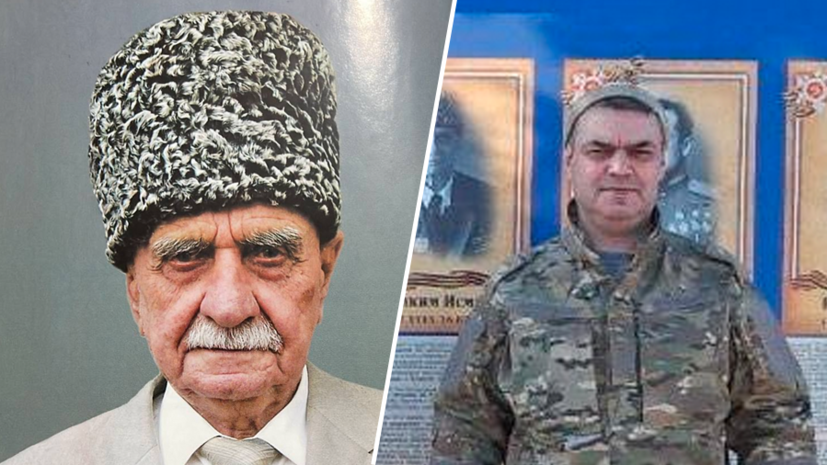47-year-old Aidemir Ismailov, the grandson of a Hero of Russia, a WWII veteran, has been on the front line for only a week.
Before that, he was trained at the training ground along with other volunteers.
The man emphasized that he went to the Northern Military District because he could not do otherwise - all his ancestors were warriors: “I had to [go to the Northern Military District].
This is a family thing for us.
I am a major myself, a police officer.”
The father, grandfather and great-grandfather of RT’s interlocutor fought.
“My maternal great-grandfather was in the army during the Russian Empire.
In the courier service they were on the Caucasian line under Ermolov.
We have generations of warriors, it’s in our family.
Our men have always defended the Fatherland: the Russian Empire, then the Soviet Union, the Russian Federation.
There is a strong continuity of generations in this regard,” explains Ismailov.
RT’s interlocutor also expressed the opinion that Ukrainians are now participating in “not their own war” in the Northern Military District.
“If I had the opportunity to address that front line, I would like to tell the guys not to do stupid things - why die in vain?
This is not their war, but the Europeans', a political war.
It’s a pity for the youth, it’s a shame that guys are dying for nothing,” says Ismailov.
He recalled that in the famous photograph of Yevgeny Khaldei, “The Banner of Victory over the Reichstag,” a resident of Kyiv, Alexey Kovalev, is depicted together with his grandfather Abdulkhakim Isakovich.
Until his death, he remained a close friend of Ismailov Sr., often traveled to him in Dagestan and himself hosted him as a guest.
“In our family archive we have photographs taken during his visits,” noted Aidemir Ismailov.
Alexey Kovalev and Abdulkhakim Ismailov.
© Photo from personal archive
“Grandfather did not tolerate lies”
Ismailov warmly recalls the periods in his childhood that he spent with his grandfather in a Dagestan village - his parents sent him and his brothers there every summer.
Abdulkhakim Isakovich had many grandchildren, but only three boys, including Aidemir, the eldest.
Together with them, Abdulkhakim Isakovich was engaged in simple labor; in Dagestan he had a large farm: sheep, cows.
According to RT’s interlocutor, it was his grandfather who gave him many important qualities.
“My grandfather instilled in me and all his grandchildren hard work, courage, honor, and dignity.
At the same time, the man was very modest - and taught us to do the same.
He couldn’t stand lies, couldn’t stand being lied to, and he always told only the truth.
He said what he thought, and he didn’t give a damn whether anyone liked it or not,” recalls Aidemir Ismailov.
Aidemir Ismailov and Abdulkhakim Isakovich Ismailov.
© Photo from personal archive
According to him, Abdulkhakim Isakovich did not like to talk about the war, and his relatives tried not to bring up this topic in conversations with him.
His grandchildren learned the details of their grandfather’s exploits already in 1996, when, by decree of the President of the Russian Federation, Abdulkhakim Isakovich was awarded the title of Hero of Russia “For courage and heroism shown in the Great Patriotic War.”
Abdulkhakim Isakovich Ismailov was born on July 1, 1916 in the village of Chagar-otar, Khasavyurt district of Dagestan.
In 1939, Ismailov was drafted into the army and took part in the Finnish military campaign.
After the start of the Great Patriotic War, Ismailov fought on the Ukrainian Front as part of the 82nd Guards Rifle Division, and then in the 83rd Separate Guards Reconnaissance Company.
At the end of the war, he served in the 8th Guards Army, 83rd Rifle Division, 101st Separate Mechanized Reconnaissance Company of the 1st Belorussian Front.
In the spring of 1945, Abdulkhakim Ismailov, along with Kyivian resident Alexei Kovalev and Minsk resident Leonid Gorychev, were captured by the camera of military photojournalist Evgeniy Khaldei when he took his famous photograph “The Victory Banner over the Reichstag in Berlin.”
RIA News
© Evgeniy Khaldey
Subsequently, these photos were prepared for publication in a textbook on the history of the Great Patriotic War for the 50th anniversary of the Victory.
The search began for the people in the photo.
Soon Alexey Kovalev got on a program with TV journalist Nikolai Svanidze, and when he was shown a photograph of Khaldei taken on the roof of the Reichstag, he immediately recognized himself, Ismailov and Gorychev in it.
After the war, Ismailov returned to his native village of Chagar-Otar, where he worked on a collective farm.
For his exploits accomplished during the Great Patriotic War, Abdulkhakim Ismailov was awarded the Order of the Patriotic War 1st degree, Glory 3rd degree, Red Banner, medals “For Courage”, “For the Liberation of Warsaw”, “For the Capture of Berlin”.
Abdulkhakim Isakovich died in Khasavyurt in 2010, at the age of 94.
A school in the village of Chagarotar is named in his honor.

